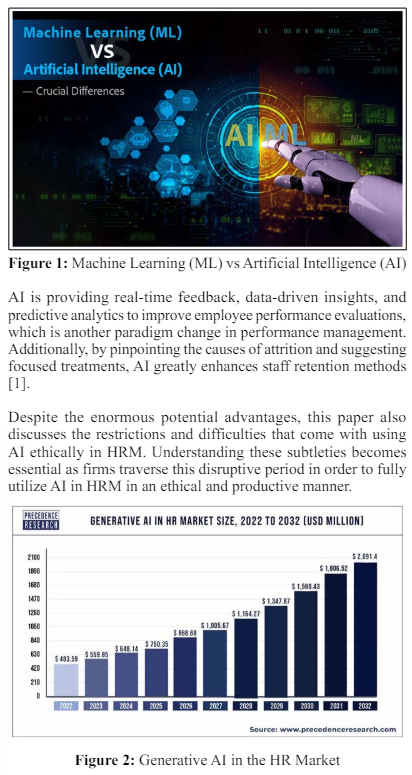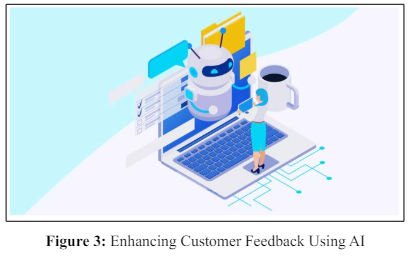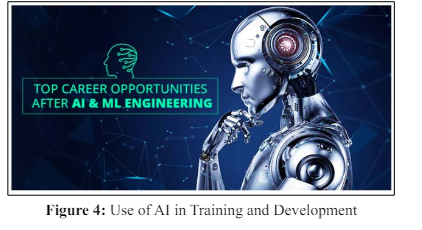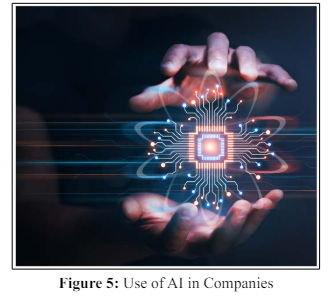Author(s): Somil Nishar
This literature review explores how the field of human resource management (HRM) has changed in response to machine learning and artificial intelligence
(AI)'s ever-changing effect. HR departments are going through a revolutionary period as a result of the fast advancement of AI capabilities. This phase
involves changing key HR operations including performance management, applicant screening, training and development, recruiting, and talent retention.
The study looks at current academic works that demonstrate the broad influence of AI in three important HRM topics. While AI promises increased accuracy
and efficiency in jobs involving humans, ethical issues become an important factor. In addition to highlighting the exciting developments made possible
by AI, the research raises ethical issues and argues for a gradual but prudent incorporation of technology into HRM procedures.
The significance of artificial intelligence (AI) and machine learning is growing in the rapidly changing field of human resource management (HRM). HR departments are entering a disruptive period as a result of the dynamism of AI capabilities, which is changing how they approach personnel acquisition, engagement, and retention. This study of the literature explores the state-ofthe-art scholarly studies that demonstrate the ubiquitous impact of AI in five critical HRM fields [1]. AI is revolutionizing the recruitment process by simplifying and improving the process of finding qualified applicants.
The use of AI algorithms in candidate screening is making the process more effective and sophisticated, empowering HR professionals to make better judgments. AI is helping training and development programs by personalizing learning and adjusting to the demands of each individual employee [2]. AI-driven analytics are revolutionizing performance management by offering thorough insights into worker productivity and opportunities for development.
AI also plays a key role in developing talent retention strategies by identifying trends that support employee longevity and job satisfaction. Even though these developments are very promising, the literature study also highlights the drawbacks and difficulties that come with using AI ethically in HRM [3]. It looks at ways to integrate technology responsibly and progressively, opening the door for a time when AI will support HR procedures in an efficient and morally sound way.
The rapidly advancing fields of artificial intelligence (AI) and machine learning are driving a dramatic revolution in human resource management (HRM). The increasing complexity of AI capabilities is about transforming the core elements of HR procedures, including hiring, screening candidates, training and development, performance management, and retention. This study of the literature explores recent scholarly findings and offers a thorough summary of the ways in which AI is changing these important aspects of human resource management [4].
Artificial Intelligence (AI) is simplifying recruiting procedures by removing prejudice, automating the sourcing of candidates, and improving the effectiveness of talent acquisition. AI-driven algorithms are used in candidate screening to go through large datasets and find the best applicants. This process improves decision-making and guarantees a more accurate match between applicant qualifications and job criteria. Training and development programs that use AI can offer more individualized learning experiences by customizing information to meet the needs of each learner and optimizing skill acquisition.

While hiring process optimization and streamlining are greatly aided by AI automation, there are certain hazards associated with it as well that should be carefully considered. One important worry is that if algorithms are trained on homogenous samples, biases may persist [5]. A lack of diversity in the training data might cause the algorithms to unintentionally reinforce preexisting biases, which would result in unfair hiring practices.
Furthermore, the use of intrusive data-gathering techniques in conjunction with AI algorithms raises the possibility of privacy violations. There is a rising need for greater accountability and transparency measures as these algorithms make judgments that directly impact job seekers more and more. In order to promote trust and moral use of these technologies, methods that provide a greater understanding of how AI systems make judgments must be given top priority by those involved in the hiring process [3].
The overall effect of AI automation on recruiting is favorable, notwithstanding these difficulties. It enables HR departments to better allocate resources and increase productivity by enabling them to manage their procedures in an effective and efficient manner. In order to ensure an equitable, transparent, and responsible integration of AI in recruiting methods, it will be imperative to address these dangers as the technology advances.

The applicant screening process might be revolutionized by Artificial Intelligence (AI) by utilizing sophisticated features like voice and video interviews. Automated analysis of a wide range of aspects, including speech patterns, emotional signals, semantic information, and micro expressions, is made possible by these technologies [3]. Organizations might potentially reduce inherent biases associated with human interviewers by utilizing AI for applicant evaluations. The selection process is becoming more impartial and objective as a result of the move toward computerized review. Furthermore, the interview process gains unmatched flexibility via AI-driven evaluations. Interviews can take place at a time and place most convenient for the candidates, increasing convenience overall. This flexibility guarantees a uniform evaluation norm for every applicant while also accommodating a range of timetables [6]. Artificial Intelligence (AI) has become a vital tool in the recruiting landscape due to its convenience factor and precision in analysis. It has streamlined the screening process and optimized the overall efficiency of talent acquisition. It is becoming clearer that recruiting methods might become more impartial, inclusive, and efficient as businesses continue to use AI technology.
Artificial intelligence (AI) has the potential to make tremendous strides in the field of learning and development. The advent of customized, self-paced eLearning made possible by virtual instructors who can adapt to the needs and interests of specific employees is one noteworthy advantage. With infinite data storage and recall capacities, these AI instructors overcome the drawbacks of conventional one-on-one human instruction by offering flexible and accommodating advice. AI chatbots also serve as immediate expert advisers, giving staff members quick access to pertinent knowledge whenever they need it [7]. Furthermore, workers may rapidly produce polished communications that follow organizational requirements by utilizing enhanced writing tools driven by natural language processing. The benefits of using algorithms are strong, even if there are worries about possible negative effects, such as impersonal standardization and the loss of jobs for human trainers [8]. AI creates a revolutionary change in the professional development and skill-enhancementenvironment by guaranteeing that workers have continuous access to possibilities for specialized development that are customized to their own objectives.

By utilizing its capacity to analyze communication patterns, gather productivity data in real-time, provide immediate user feedback, and forecast future performance trends, artificial intelligence (AI) dramatically improves performance management [9]. This technology integration lessens administrative responsibilities while providing managers with the resources they need to make data-driven, well-informed choices. Managers can now proactively spot problems thanks to AI, which gives them the power to teach struggling team members on time and help them achieve better results. Critics, however, express worries about how continual monitoring and computerized decisions might erode justice and confidence.
There are many who doubt computers' capacity to represent the finer points of human performance [7]. A balanced strategy that blends AI capabilities with human insights is recommended to allay these worries. In addition to leveraging modern analytics, this cooperative effort minimizes the drawbacks of artificial intelligence. AI has the power to completely transform performance management when used responsibly, improving its efficacy, engagement, and alignment with corporate objectives.
Artificial intelligence (AI) skillfully solves the enduring problem of HR's inability to retain high performers by predicting possible flight risks and suggesting tactical solutions for workers exhibiting indications of leaving. Through the examination of past turnover data, AI can identify trends that point to increased risk, which makes it possible to develop procedures that improve retention tactics [3].
The use of automated stay interviews is quite beneficial, as these questionnaires cover the whole range of employees to evaluate engagement levels and identify any problems early on. This proactive approach makes it easier to identify issues before they get more serious and leads to plans to leave.

Furthermore, HR uses offboarding questionnaires to gather information as an employee leaves, giving useful input that helps retention tactics be continuously improved. HR professionals may make well-informed decisions thanks to the abundance of data produced by AI-driven analytics, which also creates a flexible and adaptable framework for talent management [8]. AI becomes a crucial instrument in this changing environment, not just for anticipating flight hazards but also for creating a work environment that promotes employee loyalty and happiness.
Some contend that placing too much focus on metrics in HR might have coercive effects and reduce employee autonomy. They voice worries that an inflexible emphasis on data can result in a punitive rather than a developmental approach, potentially misusing data. Advocates, however, contend that when AI is used constructively, it provides Human Resources (HR) with an invaluable instrument for continuously improving retention tactics [3].
HR practitioners may identify areas that need development by utilizing data analytics to obtain insights into employee engagement, happiness, and performance. When AI is applied as a developmental tool, it can enable businesses to design more individualized and successful talent retention plans, which will improve the work environment [10]. In order to fully utilize AI in HR management, it is imperative to retain a human-centric approach while also balancing data-driven decision-making.
The overwhelming body of research demonstrates how AI is revolutionizing HRM to make it far more responsive, consistent, efficient, and successful across related disciplines. Letting up of administrative responsibilities frees up talent to express creativity. Analytics enhance perceptions for better judgment. Adaptive training enhances growth continuously. Predictive risk modeling also enables tactics to continuously improve. Concerns about dehumanization, privacy, and openness should be addressed through governance that maximizes advantages while reducing harm. However, carefully crafting creative applications offers significant benefits. Thus, combining human strengths with algorithmic skills paves the way for a revolutionary transformation in HRM performance. The potential for HR departments and AI skills to work together to elevate both parties' capacities in the interest of successful businesses and employees appears to be rather promising
